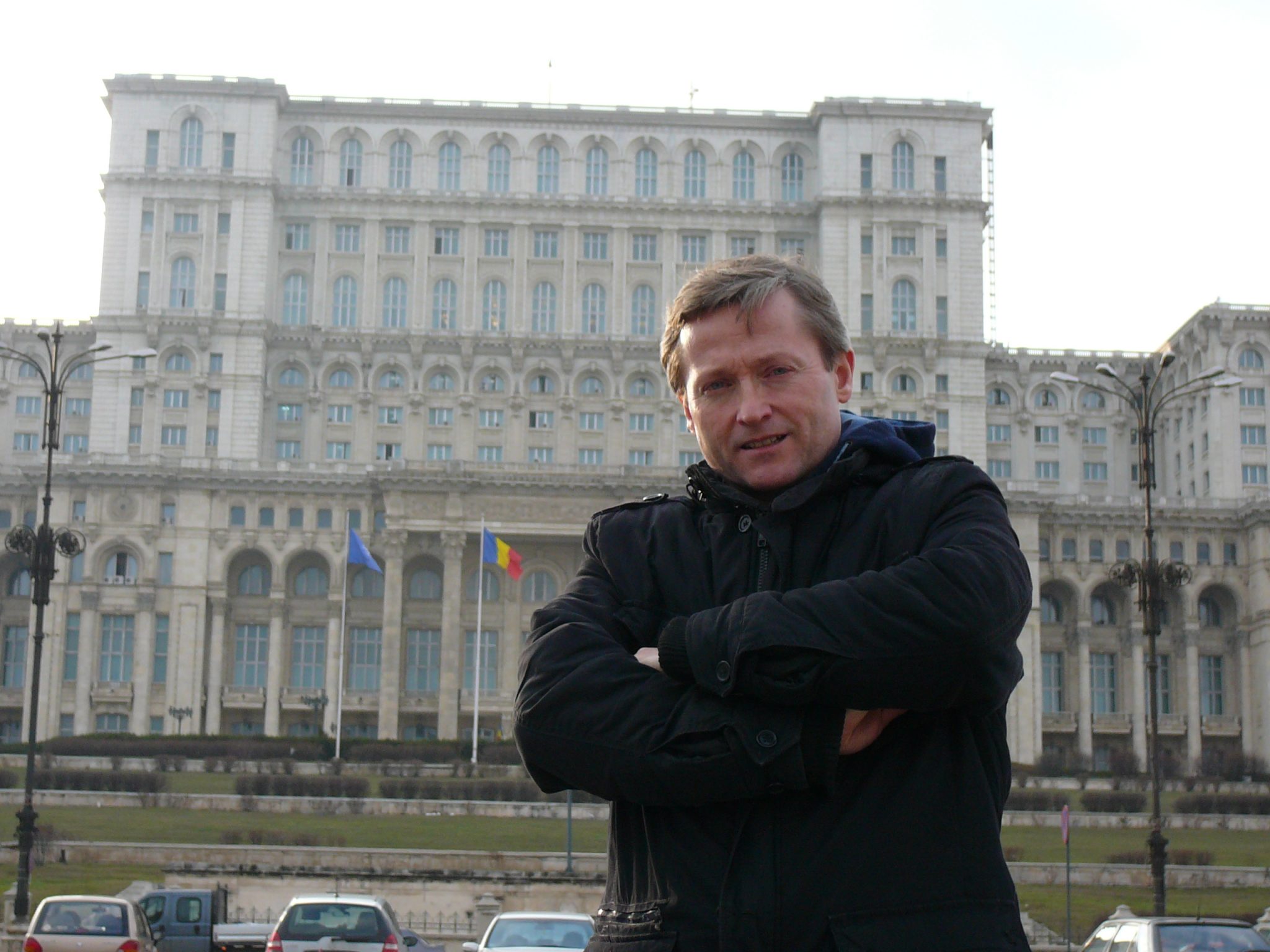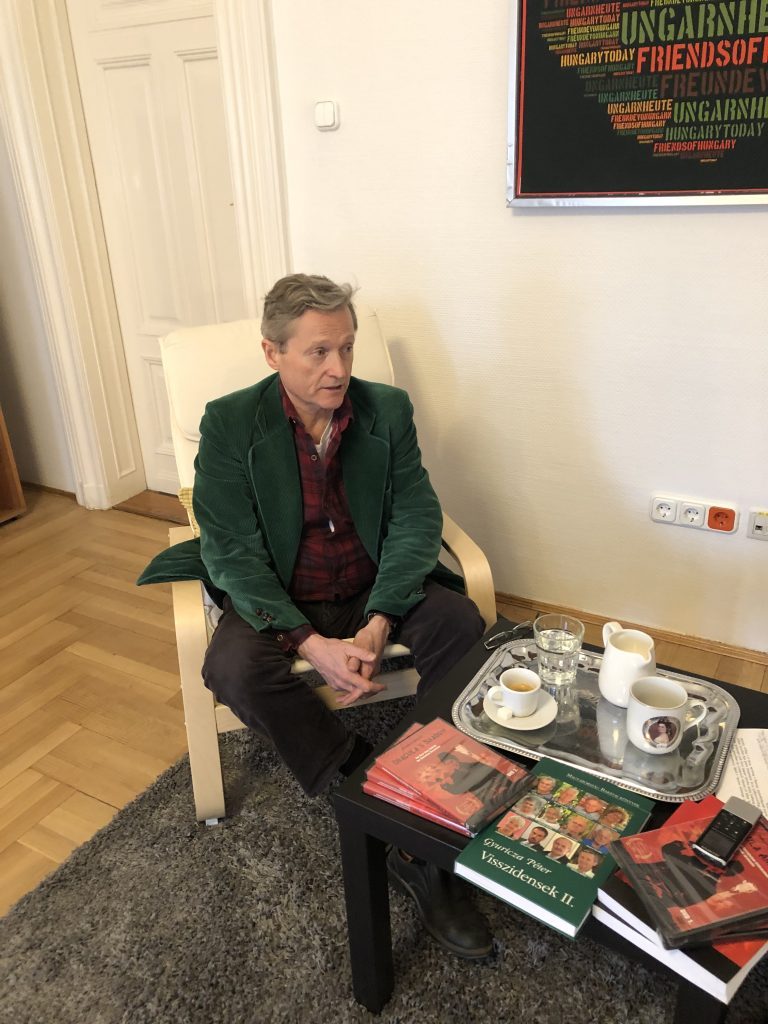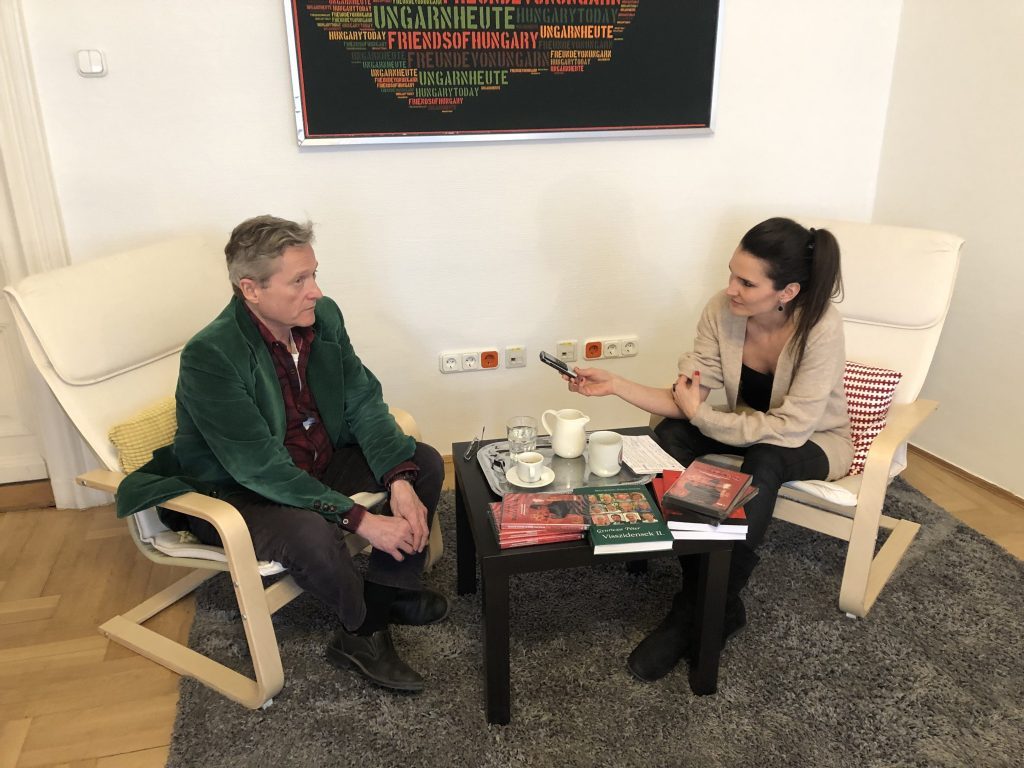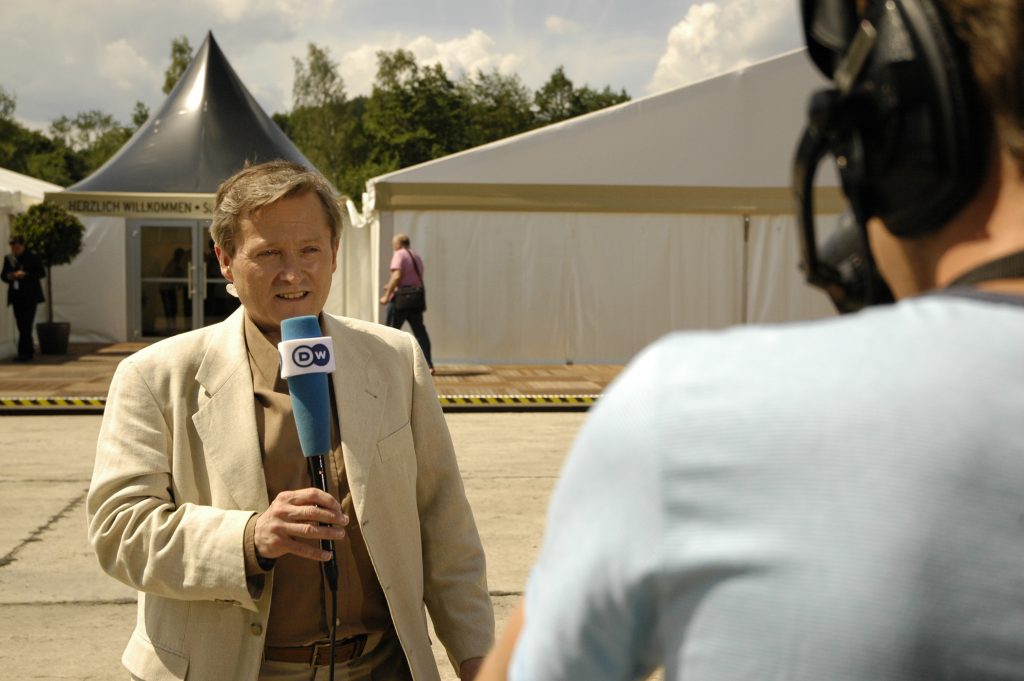
His mother is Austrian, his father Hungarian, and he was born in Toronto. He didn’t speak Hungarian until age 17 when he first started learning, far from the country, using sports newspapers. For the past 3 years, he has been travelling between Budapest and Berlin working for Deutsche Welle and the Hungarian Television network. Though he could be Canadian, German, or Austrian, he identifies as Hungarian. When asked why, he replies: “My father was an incredible person. I always thought that a person like this couldn’t be from just anywhere. Our sister site, Ungarn Heute’s interview with Árpád Szőczi.
You said you like to play football, it wasn’t too long ago that you played with the seniors against Hertha and you won the tournament. Do you follow Hungarian football as well?
I have been following Hungarian football for decades. It’s rare that I don’t read over the Nemzeti Sport (National Sport) whenever I am home. I watch the games and in fact, from time to time I go out and watch them live. Most recently I was in the Groupama Arena watching the Ferencváros-Honvéd match. I went with Csaba Renzo Emődy who previously worked in a high position with the Argentinian River Plate football team. We really enjoyed it.
Do you have a favorite team?
If a Hungarian team —it doesn’t matter which one— gets to an international championship, then I of course cheer for them. I respect whoever plays well. Earlier, this was why I loved Diósgyőr, because they had such great potential even though they were a small team. For example, Luque from Spain played there for a few years and shot some incredible goals from freekicks and the team just generally played very well. I know a couple of players and coaches personally: not long ago I sat down with Pál Orosz, the head director of the Ferencváros team. Csaba Emődy and I both think an Eastern European league with the Visegrad Four could be good. If the teams are playing each other, they will keep up the pace and the game will be more attractive to fans and players alike. This is how we could build it up for the future. The key question is, naturally, funding.
There definitely is money in Hungarian football. In a slightly altered Puskás quote: “big money, small football” – this is basically the situation currently. Why are there no results? Are funds not going to the right places?
I think they are going to the right places. For example, Vidi played very well in the European League this year, true they, unfortunately, did not make it further, but they had the potential. However, at the same time, it surprised me that Fradi could not achieve this as well. If more youth got more opportunities – and there are coaches in Hungary who pay attention to this—that would be a good start. And there are a few very good foreign players here too. Many criticize the government for investing too much money into football, and that it should be put instead to improving healthcare and education. I say, why not all three? Hungary is in a much better economic position than before 2010. Foreigners who come here, even just visiting as a tourist, fall in love with Hungary and Budapest. So there is money, it just needs to be used wisely.

Sports helped you learn the Hungarian language. From sports news. Why did you find it so important?
I was 18 when I first came to Hungary, I spent 3 months at the Debrecen Summer School. I was already a crazy football fan back then. But in Canada, where I’m from, there were slim chances of me finding a good youth team for myself, or even seeing a live game. When I came here, I saw there was coverage for not only football, but all sports. I went out to Népstadion (People’s Stadium) where I witnessed the 60 thousand fans watching the derbies. It was amazing. And when I discovered there exists a newspaper that’s printed every day and is only covers sports, I was overjoyed. Of course, in the beginning I didn’t understand a lot of phrases. I would diligently bring the paper home to read, and try and get through it with my dad’s help.
Your father is Hungarian, your mother is Austrian, and you grew up in Canada. You didn’t use the Hungarian language at all in the family?
My father spoke English with me until I was 18 years old. Afterwards I started to understand enough Hungarian that he would try to speak Hungarian with me. In the following 20 years he only spoke Hungarian with me.
Your father started a new life in Canada at the beginning of the 50s. After the end of communism, he didn’t want to move back home?
I often asked him that too. He said no. He would have gladly moved to Berlin to be with us, he had previously suggested this. Back then I didn’t have work in Budapest. We lived in Germany full-time.
Did you ask him why he didn’t want to return to Hungary?
He couldn’t really answer this. He said: “Because this was my decision.” He suffered from homesickness, it was almost a disease for him. This problem wasn’t unique to him though, his other friends out in Toronto also felt it. If friends came over, we never talked about Canadian politics, always about what was going on in Hungary and with Ceausescu.
Your father did a lot to support the Hungarian minority in Transylvania, and you later joined. For instance, a historically significant interview with Reformed pastor, László Tőkés, is tied to your name.
I only had a minor role in this secret mission, just to convince someone to give money. We could never have imagined the consequences, and most definitely we did not the expect the ensuing bloodbath in Temesvár. We thought it would just be an interview with someone living under a dictatorship, someone who people barely knew of around the world. Because of this interview, he later had to leave the church, and this is where the intentions ran amok.
In December of 1989, the fall of communism began with a bloody revolution in Romania. Because of the oppressive dictatorship, the majority of people lived in poverty and the rights of minorities weren’t protected at all. Though the rest of the Eastern European countries ended communism through peaceful means, Romania was the only country behind the iron curtain where the transition was violent. One of the symbolic points of the uprising and a catalyst spark was the interview with pastor László Tőkés from Temesvár (Timisoara), done by two Canadian reporters. Tőkés strongly criticized Ceausescu, the Romanian dictator, in this interview. Árpád Szőczi helped in obtaining funding for this interview. More than 1100 civilians died in the streets during the uprising.
At the same time, that’s when the West’s attention was called to the situation in Romania…
Of course, the world found out who László Tőkés was, it found out there is an enormous Hungarian minority in Romania and that there is an evil dictator, Ceausescu.
Both a book and documentary have been made on the Temesvár uprising, and now you are trying for a feature film with the Hungarian National Film Fund. Why do you want this to be created?
This year is its 30th anniversary. I thought it would be a good time to show the world what happened 30 years ago. The documentary was successful too, shown in 20 cities throughout the world. This Cold War story is truly astounding. So much so that it would be a shame if everyone couldn’t witness it.

The battle for Hungarian minority rights is still ongoing in Romania. Are you still actively involved in this?
I’m a reporter so I can’t take a side, so I am no longer active. When I was organizing protests I wasn’t working for the news but rather a magazine. Of course, I’m still following the news concerning Transylvania. The situation is difficult and the European Union – aside from Poland and Hungary—doesn’t interfere in other countries’ affairs. The EU is not blind, they obviously see what’s going on, but they still do nothing. It’s extremely saddening that it happens that past Securitate officers still work in the Romanian secret service. Or, that a pure Hungarian medical university in Marosvásárhely (Targu-Mures) can’t be independent. Where are we? In Cuba or Europe?
It’s rare that someone can work in the German and Hungarian media, but for 3 years now you been involved with both on a daily basis. Where can you work more freely?
I can work freely everywhere. The news sector is such that all I do is explain what’s going on and broadcast that information. I fully understand that this is a government channel, and it is clear that if the government has information it wants to spread, this is where it can do it. They never wanted to restrict me in anything. If there were mistakes in the original Hungarian report and I fixed it, they appreciated that too. Instead, I take issue with what the German media says about Hungary. One time I had to explain to another Hungarian-German reporter that the prevalence of anti-Semitism in Hungary isn’t true, nor is Jobbik everywhere. I told him I live here, and I don’t see this.
Is it only from our perspective that Hungary is a very popular topic in Germany, or is this the case in reality too?
It’s true, they heavily criticize the Hungarian government, claiming that its anti-Semitic, that there isn’t complete freedom of the press, that human rights are restricted, and that hoards are protesting against the government. I believe they emphasize Hungarian and Polish critical propaganda too much. What I always repeat at my workplace at Deutsche Welle, is that there is no other politician in Europe that has been elected three times in a row with such a majority. So we can say what we want, the people like it.

And the general opinion? Hungarian, pro-government analytical companies are conducting studies which indicate that general opinion is starting to favor Hungary, if not in matters of media or politics, but mainly in the question of migration. The truth is difficult to determine from here in Hungary, what is your experience?
Yes, there are definitely a lot of positive examples as well. Throughout Bavaria, many support what Viktor Orbán is doing. In the eastern part of the country, they also tend to praise his politics. However, the German government generally does not like what the Hungarian government does. But this is not only true for Germany, but for Western Europe, too. I think there are a lot of misunderstandings that should be cleared up. It’s very interesting that a couple of months ago an Al Jazeera reporter came to ask me about the Hungarian situation, and I agreed. But since then he hasn’t contacted me and hasn’t answered my messages.
Hungarian politicians often cite the German media structure as a truly dire situation because German news is even more influenced by the government. How do you see it?
I haven’t experienced this at all. If Angela Merkel’s party does badly in an election we of course talk about that; we even have studio guests who claim Merkel is losing votes because of migrant-politics. What is more interesting to me is what is happening in France—and the German government doesn’t say anything about this. This is the weirdest thing to me.
In an earlier interview, you said you’ve considered yourself Hungarian since you were a child. You could be Canadian, Austrian or even German. Why is this identity your strongest?
I think because of my father. He always told many stories of his life, of what happened in Hungary. We had a couple of nice picture books from Hungary. I loved him so much and I was so proud that he was a real gentleman in the Hungarian army. For example, he told me the story of when a German soldier wanted to execute a 14 year old Ukrainian boy accused of being a spy. My father didn’t let it happen, in other words, he saved the boy’s life. Granted, the next day they locked him up in SS prison. Growing up with a person like this left a huge impression on me. I always thought that a person like this couldn’t be from just anywhere. For a long time I thought I didn’t need another language aside from German and English because it would just isolate me more from the other kids. At 16 I realized that this is ridiculous and I decided to take advantage of the opportunity to learn Hungarian. It was one of the best decisions of my life.
Interview by Zsófia Nagy-Vargha, Ungarn Heute
Translation by Katrina Hier